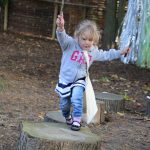This is a repost from the Centre for Research in Arts, Creativity and Literacies (CRACL) blog. The original post was written by Pat Thomson, Professor of Education within the School of Education, University of Nottingham (UK).
We have been conducting an evaluation of learning in the Serpentine’s World without Walls programme. We have just reported on our interim results from an examination of two projects. One was the first instalment of Changing Play, a project conducted in partnership with the Portman Children’s Centre.

Anton Franks did this first set of research. His investigation of the work that artist Albert Potrony did suggests the following benefits for children:
- awareness and understanding of a range of materials and objects, manipulative skills in handling large and small materials and objects, and ability to conceptualise them in form and use
- imaginative development in the interaction with materials, objects and other children, allowing experimentation in applying and combining of materials.
- linguistic development in the use of words, utterances and in the construction of narratives accompanying play and reflecting on it afterwards is essential in early conceptual development.
- the richness of children’s narratives incorporated their understanding of social relations and responses to immediate and mediated culture – many instances of children making references to familiar media characters (notably Power Rangers) and to their experience of social and cultural life (home life, rockets, putting people in prison)
- the ability to ‘read’ materials and objects – to name things in their playworld and to construct complex narratives adapting them to their imaginative purposes – are powerful precursors of literacy development
- looking at the images the artist had taken of the children in play and then reflecting on them later, interpreting them and making narratives assisted the development of memory
- continuity and consistency in working regularly with a particular group of children – the original plan was to work both with the Nursery and with a drop-in parent and toddler group, ‘Stay and Play’, but after reflection and discussion with staff this was modified to concentrate on working with the Nursery children
- particularly apparent was children’s increasing sense of autonomy in the playworlds they created, affording them a clearer sense of their own developing character and personhood for themselves and in relation to others. Children were able to lead adults into and through their imaginative worlds, involving them in their play
There were also benefits for nursery staff and children. You can read our full interim evaluation report here as a downloadable pdf. worldwithoutwalls_interimresearchreport_final-copy




